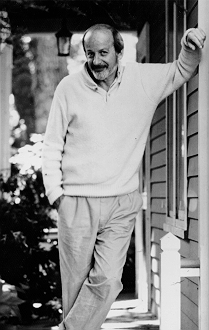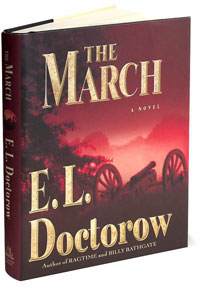
| NYWI HOME PAGE | VISITING WRITERS & EVENTS INDEX | VIDEO ARCHIVES | NYS AUTHOR & POET AWARDS |
 |
New York State Author 1989 - 1991
Previous Visit:
New York State Writers Institute, April 19, 2006
8:00 p.m. Reading | RPI, Darrin Communications Center (DCC 308)
Troy,
New York
Edgar Lawrence Doctorow is widely recognized as one of America's great masters of the historical novel. He is the author most recently of The March (2005), a fictional account of General William Tecumseh Sherman's infamous military rampage from the burned-out ruins of Atlanta to the Atlantic ocean, and north into the Carolinas, leaving a path of destruction that affected the South for generations. The March recently received the 2006 PEN/Faulkner Award and the 2005 National Book Critics Circle Award and was a finalist for the 2005 National Book Award.
 "a mosaic composed of 'little' lives, each with its uniquely human value, destroyed or saved by the hazards of war."— Madison Smartt Bell, Boston Globe
"a mosaic composed of 'little' lives, each with its uniquely human value, destroyed or saved by the hazards of war."— Madison Smartt Bell, Boston Globe "In his brilliant historical work… E.L. Doctorow has brought the end of America's wretched civil war fearsomely to life…. [his] writing here is magnificent, the details he selects unerringly trenchant."— The Economist
"a very fine, robust and deeply intelligent novel. The only novels of the Civil War that rank with it, to my knowledge, are Stephen Crane's 'The Red Badge of Courage' and McCarthy's 'Blood Meridian.'" — Vince Passaro, The Nation
"It is Mr. Doctorow's achievement in these pages that… he manages to weld the personal and the mythic into a thrilling and poignant story." — Michiko Kakutani, New York Times
Doctorow served as senior editor for New American Library from 1959-1964 and editor in chief of Dial Press from 1964-1969. Since 1969, Doctorow has devoted his time to writing and teaching. He has been associated with several colleges and universities, including the University of California, Irvine; Sarah Lawrence College; Yale University Drama School; Princeton University, and, currently, New York University where he holds the Glucksman Chair in American Letters. In 1984 he was made a member of the American Academy and National Institute of Arts and Letters.
Highly-regarded and controversial, Doctorow's work is characterized by serious philosophical probings, a subtle and diverse prose style, and placement of historical figures in unusual, sometimes bizarre, situations and settings. His novels stretch the limits of the literary genres on which he draws.
Welcome to Hard Times (1960), for example, is a Western. Using the form, he fashioned the materials of the Great Plains experience into an allegory of man and evil. The book was inspired by his job as script reader for Columbia Pictures (1956-1959). In his second novel, Doctorow turned to science-fiction. Big as Life (1966), is a satire set in a future New York.
With The Book of Daniel, published in 1971, Doctorow established himself as a major American writer. Nominated for a National Book Award, the novel was inspired by the Atom Spy Trials during the anti-communist fervor of the 1950s.
Ragtime (1975), written while Doctorow was a Guggenheim fellow and a Creative Artists Service fellow, took the literary world by storm. Set in the decade prior to World War I, Ragtime "rags" an array of historical figures that include Houdini, William Howard Taft, J.P. Morgan, Sigmund Freud, and others. Historic and imaginative events are woven so skillfully that by the end of the novel the nature of historical truth is called into question. Ragtime received the first National Book Critics Circle Award for fiction in 1976 as well as the Arts and Letters Award given by the American Academy and National Institute of Arts and Letters.
In Loon Lake (1980), Doctorow continued to experiment with prose style as he explored yet another period in American history, the Depression. Set in the Adirondacks, the novel moves not linearly, but in concentric circles, to set American dream in the context of American nightmare.
Lives of the Poets: Six Stories and a Novella (1984), once again presented readers with what they have come to expect from him over the years: a literary surprise, in its form, content and stylistic intention.
With dazzling prose, Doctorow took on a new literary form, the memoir, in World's Fair. The novel received the 1986 National Book Award.
Other works include a recent book of short stories, "Sweet Land Stories" (2004); two volumes of selected essays "Reporting the Universe" (2003) and "Jack London, Hemingway, and the Constitution" (1993); and a play, "Drinks Before Dinner" (1979), which was produced by the New York Shakespeare Festival. Doctorow also provided the text for "Lamentation: 9/11" (2002), a volume of photographs by David Finn documenting the posters, signs, drawings, and other personal messages posted throughout New York City in the aftermath of the World Trade Center disaster. Doctorow is a past recipient of the Edith Wharton Citation of Merit for Fiction, and served as New York State Author from 1989-1991.
Doctorow's novel, Billy Bathgate, published in February, 1989, again illuminates history--the era of Dutch Schultz--with myth, transforming half-understood, haunting materials of American culture into art.
Doctorow was born in New York City on January 6, 1931. He attended the Bronx High School of Science, received his B.A. in 1952 with honors from Kenyon College, and continued his study with graduate work at Columbia University.
Selected Books by E.L. Doctorow:
NOVELS
- WELCOME TO HARD TIMES. New York: Simon & Schuster, 1960.
- BIG AS LIFE. New York: Simon & Schuster, 1966.
- THE BOOK OF DANIEL. New York: Random House, 1971.
- RAGTIME. New York: Random House, 1975.
- LOON LAKE. New York: Random House, 1980.
- WORLD'S FAIR. New York: Random House, 1985.
- BILLY BATHGATE. New York: Random House, 1989.
- LIVES OF THE POETS: SIX STORIES AND A NOVELLA. New York: Random House, 1984.
- DRINKS BEFORE DINNER . New York: Random House, 1979.
SELECTED RESOURCES
BIBLIOGRAPHY
- E. L. DOCTOROW. AN ANNOTATED BIBLIOGRAPHY by Michelle M. Tokarczyk. New York: Garland, 1988.
Books
- E. L. DOCTOROW: ESSAYS AND CONVERSATIONS edited by Richard Trenner. New Jersey: Ontario Review Press, 1983.
- E. L. DOCTOROW by Paul Levine, New York: Methuen, 1985.
- TO IMPOSE A PHRASING ON HISTORY by Joseph Moses. In The Nation, October 4, 1975, p. 310.
- DOCTOROW AND KLEIST: 'KOHLHASS' IN RAGTIME by Walter L. Knorr In Modern Fiction Studies, Summer 1976, p. 224.
- MARCHING BACKWARD INTO THE FUTURE: PROGRESS AS ILLUSION IN DOCTOROW'S NOVELS by David Emblidge. In Southwest Review, Autumn 1977, p. 397.
- TYPES DEFAMILIARIZED by George Stade. In The Nation, v. 231, September 27, 1980, p. 285.
- E. L. DOCTOROW’S WELCOME TO HARD TIMES: THE WESTERN AND THE AMERICAN DREAM by Frank W. Shelton. In Midwest Quarterly, v. 25, Autumn 1983, p. 7.
- PILGRIM AMONG THE CULTURATI by Benjamin DeMott. In The New York Times Book Review, November 11, 1984, p. 1.
- LIVES OF THE POETS by John Skow. In Time, v. 124, December 24, 1984, p. 62.
- A CHILD’S GARDEN OF MEMORIES PERVADES 'WORLD'S FAIR' by Anne Tyler In The Detroit News, November 10, 1985, p. 68.
- AUTHOR, AUTHOR by Jay McIneney. In Vogue, v. 174, November 1984, p. 152.
- THE MYTH MAKER by Bruce Weber In The New York Times Magazine, v. 135, October 20, 1985, p. 24.




From the Works of E. L. Doctoroq:
"When the boat came into the slip there were two cars waiting in the rain with their motors running. I would have liked instruction, but Mr. Schultz bundled the girl whose name wasn't Lola into the back of the first car and got in beside her and slammed the door, and not knowing what to do I followed Irving to the second car and climbed in after him. I was fortunate there was a jump seat. On the other hand I found myself riding backward facing three of the gang sitting shoulder-to-shoulder in their bulk, Irving now in an overcoat and fedora like the others, while they sat and stared forward, looking through the front window at the lead car over the shoulders of the driver and the man next to him. It was not a good feeling riding sandwiched in all of this serious an-armed intent." —- from Billy Bathgate
"The impending Thaw trail was not the only excitement down at the Tombs. Two of the guards in their spare time had fashioned new leg irons that they claimed were better than the standard equipment. To prove it they challenged Harry Houdini himself to put them to the test. The magician arrived one morning at the office of the Warden of the Tombs and was photographed shaking the hand of the Warden and standing between the two smiling guards with his arms around their shoulders. He traded quips with reporters. He gave out lots of free tickets. He held the leg irons under the light and examined them carefully. He accepted the challenge. He would escape from the irons at the following night's performance at the Keith Hippodrome. With the press crowded around, Houdini now proposed his own challenge: that then and there he be stripped and locked in a cell and his clothing placed outside the cell; if everyone would then leave he would contrive to escape from the cell and appear fully dressed in the Warden's office within five minutes."— from Ragtime
Previous Articles:
Writers Online Magazine Article
Review and Audio from Ragtime
For additional information, contact the Writers Institute at 518-442-5620 or online at https://www.albany.edu/writers-inst.




